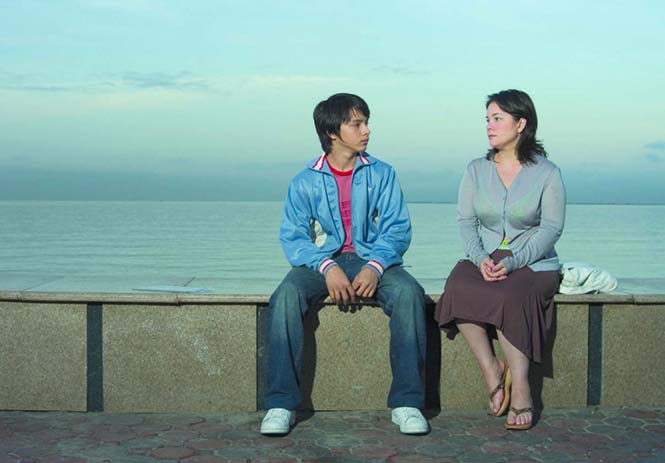Another May-December love affair, this film Belle Douleur is. And in some ways, it works; largely – I’d argue – because of the continuing “fascination” with MILFs, with the “cougars”. Yeah, the old-man-younger-woman relationship has long been “normalized” (in flicks and in real life – think of Vic Sotto in flicks and in real life); but the reverse was somewhat of a taboo for a while (thus the “controversial” tag attached to the likes of The Graduate). But this is not exactly new even in the Philippines.
More recent noted (even if they are not exactly noteworthy) local flicks touching on this are the steamy Glorious (I doubt you missed that trailer with Tony Labrusca “eating” Angel Aquino’s face); Love Me Tomorrow (with Piolo Pascual craving Dawn Zulueta); and Naglalayag (Nora Aunor herself falling for Yul Servo).
From overseas, we have the likes of How Stella Got Her Groove Back (Angela Bassett going for it with Taye Diggs) and Unfaithful (Diane Lane choosing to wrong by Richard Gere because of… well, Olivier Martinez).
And exactly because this is a well-trodden topic, I asked Kit Thompson (the young guy in the flick) what makes this different from others that came before it. And for him, “it’s just a theme,” he said. Because in the end, “it’s about this journey of going through life.” And since this is intro’d in Cinemalaya, this “journey” is given an indie treatment.
The question now is: Having seen Belle Douleur by Joji V. Alonso, is the telling of this “journey” worth watching?
This is me talking: Yes, in some ways; but no, in more ways…
WHAT IT’S ABOUT
Belle Douleur tells the story of 45-year-old Liz. She used to look after her sickly parents. When both died, she was left with “nothing” to do. She met a younger guy at that point, and they have a steamy romance. And then – to end the film via forced “conflict” – she has to choose if she wants love or she wants a career (WTF; it’s 2019!).
WHY WATCH IT
Joji V. Alonso is no stranger to filmmaking, having helped make Cinemalaya films happen in the past. For her – as she said herself when she intro’d the film during its gala – she wanted to afford herself the opportunity she gave younger filmmakers.
This is worth mentioning because Alonzo was (and is) able to get the backing of many in the film industry (e.g. iWant). And so her film has that “expensive” look; you know she was able to use equipment that may not have been readily available to others.
This helps a lot in capturing what needs to be captured.
For one, there’s Mylene Dizon (Liz) – e.g. catch the three times she shed tears and understand “subtle” acting (not quite like Jaclyn Jose, but capturing the pain all the same).
Then there are the sex scenes. Some of these are there to titillate, and – I’d argue – even to homosexualize the gaze (e.g. butt shot of Thompson/Josh). But if you’re into sex-with-the-breeze-blowing-the-curtain kind of thing, then you’d be pleased to find it here.
The others in the small cast are more than sufficient – e.g. Marlon Rivera, Jenny Jamora and Hannah Ledesma – delivering lines (from witty to sad to hopeful) with enough gusto you’re bound to believe them…


WHY AVOID IT
But this film – for me – has a number of shortcomings.
Get more equipment out there.
That scene at the cemetery (opening shot to intro us to the characters) needed another cam (e.g. while the cemetery worker was mixing sand/gravel and cement); lighting in some scenes were too dark (good for mood setting, but bad when you don’t see the facial expressions of the people on-cam); et cetera.
Believability.
When Mylene Dizon was intro’d as the Liz in this flick, I immediately already had some reservations. Here’s the thing – and this is similar to the other earlier flicks touching on the May-December love affair narrative – if someone like Mylene or Dawn Zulueta or Angel Aquino (and they were not even de-glamorized, mind you!) flirted with any hot-blooded hetero-identifying man, I am not certain I’d believe they’d say “no.”
Underdeveloped characters (affected by inconsistencies, as sated below).
For instance, we were supposed to also identify with Liz’s friends. We even get to know that the husband of the female friend cheated; and the partner of the gay friend impregnated another girl. But these characters were really ONLY there to propel Liz’s character.
There’s Liz herself who hosted a complete stranger to have breakfast with her. And then basically sexually molested him the next time they saw each other by jumping into his car and then eating his face (note that she’s a psychologist).
Inconsistencies.
The main characters are the exemplifications of these inconsistencies.
For one, the director wants us to “feel” for Josh – e.g. that he’s a good guy (despite his age); he’s not like others who just sleeps around. But – guess what! – the film ended with him fucking the very first girl set up for him by the one woman he supposedly loves. This inconsistent character development is annoying because we’re basically told that the entire “sweet” guy we were made to see was nothing but “for show”; and this was not even “merited” by this character, just really (blamable to) lazy writing…
And then there’s Dizon/Liz herself, at one time “manang”/matronly, and other times sexy/sexual. She wants to be sold as “manang” who forgot to look after herself by looking after others; and then when she dresses up (even in those clothes for lounging at home) or even strips (like when they first fuck), she’s Mylene-the-sultry-actress. For a film with a director that boasted having someone overseeing “continuity”, this is an (idiotic/unforgivable) inconsistency.
Liz was also “sold” as someone whose life revolved around her sickly parents; which is why when they died, she had nothing to do. AND THEN we discover she has a fucking job, where she spends more hours than she actually has, so she actually is ALSO a career woman and she HAS SOMETHING TO DO/OCCUPY HER. Tackling mid-life crisis is fine; but this film wasn’t promoted/advertised as such. So this inconsistency is irritating…
Forcing narratives, characters, et cetera.
When you say someone is “young”, he doesn’t have to appear like some skateboarder (and this is recognizing that there are older skater boys; but this is just to get this point across). So when you first see Josh, he is this forced-to-look young bull-capped antique shop owner; supposed to contrast his youth with Liz’s age. Except that the look felt… forced.
Then there’s the would-be/future wife who was intro’d late in the flick. We’re supposed to say “we’re okay if you give your BF away to this LOVELY, LOVELY lady”; except that… we really only know her as the “panakip-butas”/replacement, so that making us be okay with her is… forced.
It doesn’t know where to go…
The film ends with Liz choosing career over love; perhaps representative more of the generation of the director who just has to sacrifice something (i.e. career or family). But this ending is not even earned because all throughout the film, Liz COULD HAVE IT ALL. The director seemed NOT TO WANT TO GIVE IT TO LIZ. And so we’re left with a film that wants us to be “happy” for a character that chose to be “sad”; not because she deserved it, but because, well… “it’s been over an hour now and we need to wrap this up.”
This is why this film, for me, is basically a telling of “how, when you’re old, you really don’t deserve to be loved and be happy.”
Messing up with details.
For a bigger production (among Cinemalaya films at least; largely because this was able to get support from others in the film industry), that this film still didn’t pay attention to details that end up as jarring is annoying. Like when Liz and Josh were having sex, and you can see Dizon’s skin-toned bra.
And then there’s that no-helmet motorcycle driving; as if this is possible, even if we know that (perhaps) the reason this was done was because they didn’t want to cover up the faces of the good-looking actors.
Details, details, details…
Aside from director Alonso, also involved in this film were:
Screenplay: Therese Cayaba
Cinematography: Mycko David
Production design: Angel Diesta
Editing: Marya Ignacio
Original Music Score: Len Calvo
Sound: Kat Salinas, Daryl Libongco, Mikko Quizon

IN THE END
You can have many reasons to like this film – e.g. Dizon’s acting (well, most of the time at least); Thompson’s nudes (if this whets your fancy); the witty sidekick lines; and so on…
But… I wished there was more. I am not asking for The Graduate re-written in Filipino; or even popcorn flicks like How Stella Got Her Groove Back and Love Me Tomorrow and Glorious.
But exactly because those are already there, and this one doesn’t add anything new or fancy or whatever to this – shall we say – sub-genre, it leaves me wanting more…

























































































